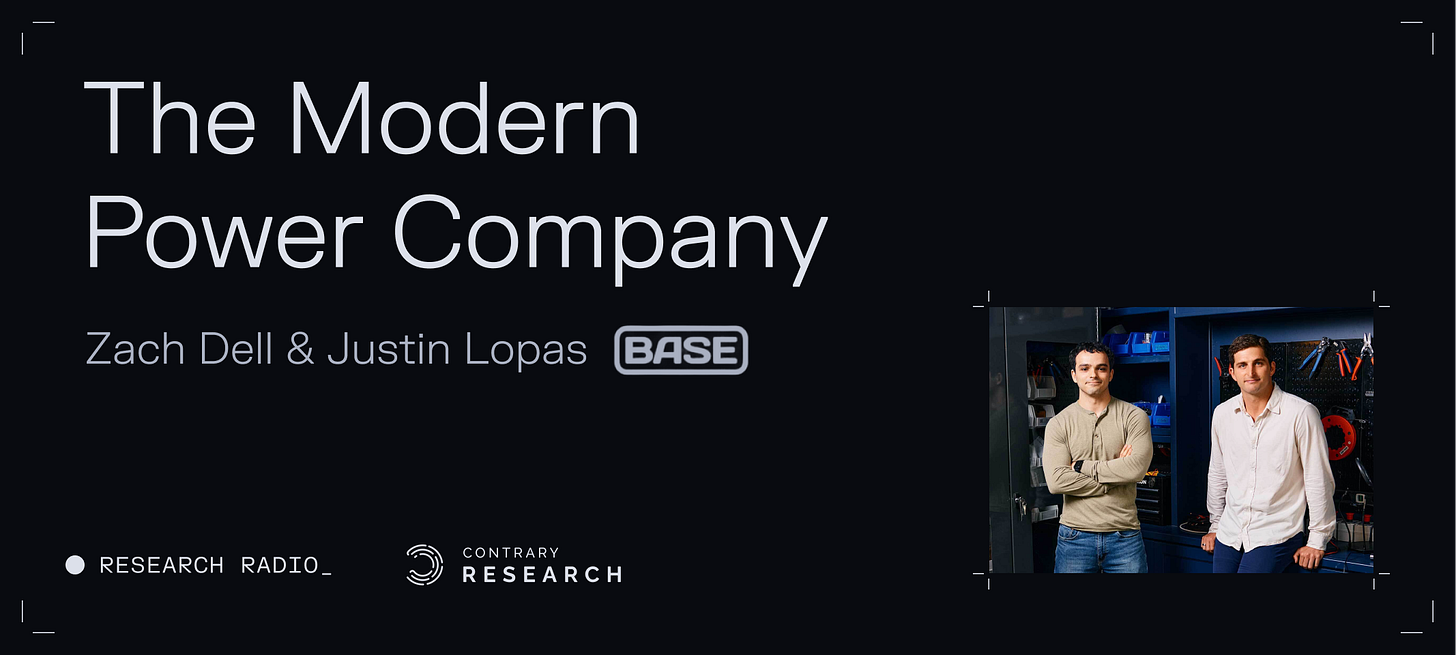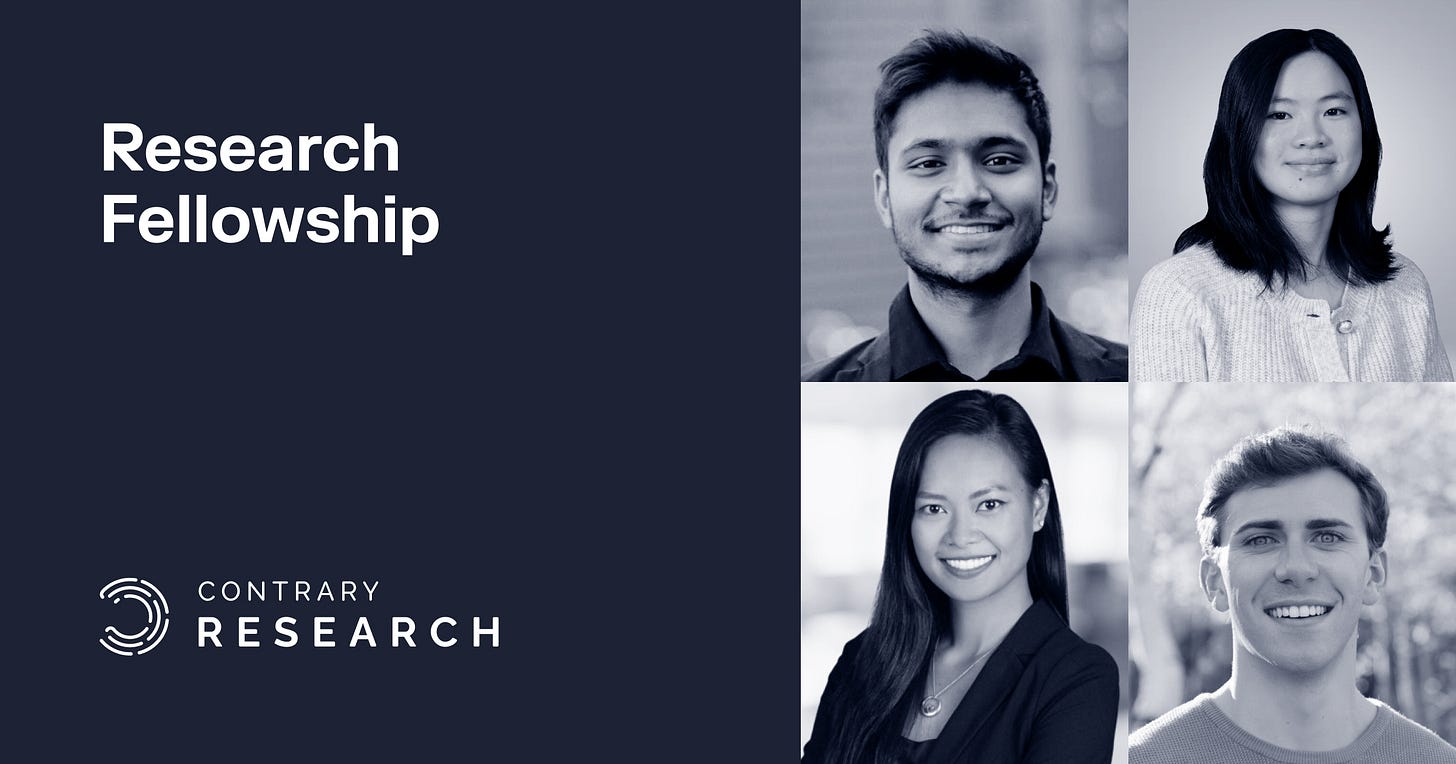Contrary Research Rundown #115
Cruise waves the white flag, plus new memos on Together AI, Melio, and Superhuman
General Motors made waves in the auto industry earlier this week when it announced that it would be shutting down its Cruise robotaxi project, citing intense competition and heavy costs associated with self-driving.
In the eight years since the automaker acquired its self-driving subsidiary, Cruise proved to be an expensive investment: General Motors lost $3.5 billion on Cruise in 2023 alone, and it lost $435 million in Q3 2024, though that was an improvement year-over-year from its $791 million burn in Q3 2023. In total, General Motors had invested more than $10 billion in the self-driving startup since 2016 before deciding to pull the plug, a hefty price tag for a company worth around $57 billion.
Since 2013, Cruise had been in a competitive arms race with other self-driving players like Tesla and Google’s Waymo, but it suffered a major setback in October 2023 that may have been the nail in its coffin. A San Francisco pedestrian was struck by another vehicle in an adjacent lane, knocking her in front of a Cruise AV, and the Cruise car, failing to detect the woman, dragged her 20 feet before stopping. At the time, Cruise had about 400 vehicles operating across San Francisco, Austin, Houston, and Phoenix, but in the aftermath of the incident, California suspended Cruise’s robotaxi permit, setting the company back as its competitors continued to make strides.
Cruise was supposed to be General Motors’ crown jewel that would give it an edge in the automotive industry. Early on, it was poised to succeed. In 2020, Cruise received approval to test fully driverless cars, known as Level 4 autonomous driving. Additionally, in 2023, GM CEO Mary Barra said that Cruise could generate $50 billion in annual revenue by 2030. The margins on self-driving car subscriptions would have presumably been much higher than manufacturing, given the capex requirements of the latter, and winning self-driving could have propelled General Motors ahead of its competition.
But instead, Cruise faltered. Meanwhile, competitors like Waymo continued to execute, with the Google subsidiary noting earlier this month that it was now providing more than 150K robotaxi trips per week across Phoenix, Los Angeles, San Francisco, and Austin. It also reported that it was about to expand its operations to Miami.
Investors have taken notice of Waymo’s progress, and Alphabet’s autonomous driving division was valued at $45 billion in a November fundraise, putting it in the same ballpark as General Motors’ entire business. With Waymo’s market share in Los Angeles now equal to Lyft and gaining on Uber, Google is beginning to look like a not-so-darkhorse candidate to win the autonomous race.
Together AI has emerged to address the needs of enterprises seeking AI infrastructure that is cost-effective, transparent, and secure. To learn more, read our full memo here and check out some open roles below:
AI Researcher, Core ML - San Francisco, CA
Forward Deployed Software Engineer - San Francisco, CA
Melio provides businesses with a digital platform to manage B2B payments and accounts receivables. To learn more, read our full memo here and check out some open roles below:
Senior Data Analyst - Compliance - Tel Aviv, Israel
Senior DevOps Engineer - Tel Aviv, Israel
Superhuman is an email client designed to boost productivity and help users manage their inboxes more efficiently. To learn more, read our full memo here and check out some open roles below:
Lead Sales Engineer - Remote (US & Canada)
Revenue Operations Analyst - Remote (US & Canada)
Check out some standout roles from this week.
Gong | Tel Aviv, Israel - Sr. Product Analyst (Data Platform), Sr. Product Designer, Sr. Product Security Engineer, Senior DevSecOps Engineer, Senior Product Manager (Data Products)
Airtable | New York, NY or San Francisco, CA - Engineering Manager (Infrastructure), Senior Full Stack Web Developer, Engineering Manager (Observability), Product Manager (AI), Application Security Engineer
Ramp | New York, NY, San Francisco, CA or Remote - Senior Product Marketing Manager, Senior Product Designer, Senior Designer/Engineer (Design System), Senior Analytics Engineer, Web Engineer (Growth Marketing), Software Engineer (Applied AI)
Databricks | San Francisco, CA or Mountain View, CA - Designated Support Engineer, Engineering Manager (Platform), Engineering Manager (Vector Search), Senior Software Engineer (Backend), Sr. Engineering Manager (Databricks Default Storage)
Google's DeepMind introduced an AI weather model called GenCast, which outperforms the European Centre for Medium-Range Weather Forecasts' ENS system. Unlike its previous model, GenCast uses an ensemble of 50+ predictions to create a range of possible weather outcomes, providing a more comprehensive forecast compared to the previous deterministic approach.
X, formerly Twitter, introduced a free, limited tier of its Grok chatbot, which was previously only available through a premium subscription. While user numbers have not been disclosed, Grok's user base is believed to be in the millions. This move could help boost Grok's user count, which is smaller compared to OpenAI's ChatGPT (300 million weekly active users) and Meta's chatbot (600 million monthly active users).
ServiceTitan's decision to go public in November was driven by a provision in its previous financing that required it to IPO sooner rather than later. CEO Ara Mahdessian dismissed claims that the IPO was conducted under external pressure. Despite industry speculation, the company saw a successful debut, with its stock rising 42% above the initial $71 price, giving it an $8.9 billion valuation.
Anduril launched the Lattice Partner Program to help companies integrate their technologies into the Lattice platform. The program provides resources for developers, such as sandboxes, documentation, and testing tools, to facilitate new application development and seamless integration. It aims to improve interoperability and enable more effective capabilities for military operations.
Amazon launched Amazon Autos, allowing customers to buy cars online from dealerships. It’s partnering with Hyundai to launch 48 US cities, including Los Angeles and New York. This follows Amazon’s announcement in 2023 to sell vehicles by 2024, with plans to expand to more cities and manufacturers in 2025.
New data from the James Webb Space Telescope reveals that the universe is expanding 8% faster than previously thought, highlighting the "Hubble tension" between observed and expected expansion rates. A study suggests this discrepancy may be due to the effects of dark matter and dark energy, rather than flaws in observations.
Google has launched Mariner, an AI agent powered by the Gemini 2.0 framework, capable of reasoning, planning, and executing tasks autonomously. Users can type requests into their browser, and Mariner will take action. This new tool, in limited release, enhances Google’s AI capabilities for complex problem-solving and task execution, making it a key part of their push to integrate AI into daily workflows via the Chrome browser.
After BeReal was acquired by Voodoo, the app changed how it requests user consent for ad tracking, which has now led to a privacy complaint in Europe. The complaint claims that BeReal used "dark patterns" to pressure users into consenting to tracking, violating the GDPR’s requirement for freely given consent. GDPR violations can result in fines of up to 4% of a company’s annual global revenue.
OpenAI launched real-time video capabilities for ChatGPT, first demoed seven months ago. With the new Advanced Voice Mode, available to ChatGPT Plus, Team, or Pro users, ChatGPT can respond in near real-time when users point their phones at objects. The feature also supports screen sharing, allowing ChatGPT to explain settings or solve problems, such as math questions, based on what’s visible on the device’s screen.
Databricks is nearing a deal for a venture funding round potentially exceeding $9.5 billion, making it one of the largest in history. The company is expected to achieve a valuation of over $60 billion, with shares priced at $92.50. It anticipates $3.8 billion in revenue for the next fiscal year.
Google's NotebookLM app introduced a feature allowing users to interact with AI podcast hosts generated from the documents they upload. The AI hosts provide audio overviews of materials like course readings or legal briefs, and now users can ask the hosts for more details or explanations. This aims to offer an interactive, personalized learning experience, like having a tutor who responds based on the uploaded content.
OpenAI’s ChatGPT, Sora video generator, and developer API experienced disruptions starting around 3 pm PT. The issue, caused by a telemetry service deployed to collect Kubernetes metrics, took about three hours to resolve. OpenAI confirmed the outage wasn’t linked to a security incident or product launch.
META’s "Video Seal" technology offers a watermarking solution designed to prevent unethical AI video use and protect originality. While similar technologies exist, META believes its approach is distinct from others, including Microsoft’s, in its implementation.
In last month’s episode of Research Radio, we sat down with Base Power Co-Founders Zach Dell (CEO) & Justin Lopas (COO). You can check out the full episode here.
At Contrary Research, we’ve built the best starting place to understand private tech companies. We can't do it alone, nor would we want to. We focus on bringing together a variety of different perspectives.
That's why applications are open for our Research Fellowship. In the past, we've worked with software engineers, product managers, investors, and more. If you're interested in researching and writing about tech companies, apply here!












